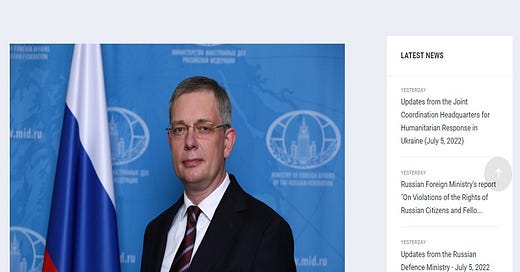The Russian Ambassador To India Confirmed Both Great Powers’ Shared Multipolar Vision
In sum, Ambassador Alipov’s interview was a concise review of the Russian-Indian Strategic Partnership at this particular phase of the New Cold War. It confirmed that both Great Powers have a shared multipolar vision and are closely cooperating with one another in order to accelerate the global systemic transition towards that end.
Russian Ambassador to India Denis Alipov confirmed in an interview with his host’s local Sputnik branch that both Great Powers have “a coinciding vision of the future world order.” He explained that their cooperation in BRICS mutually enhances their special and privileged strategic partnership by enabling it to maximize the influence that it exerts on the global systemic transition to multipolarity. Ambassador Alipov also praised India for its principled neutrality towards the Ukrainian Conflict as well as the authorities’ intervention in countering fake news in their media about it.
On that topic, he acknowledged that American influence has infiltrated that country’s information ecosystem as proven by some outlets simply republishing their Western counterparts’ pieces about Russia but said that the Indian public prefers facts instead of propaganda and therefore doesn’t pay much attention to these information warfare products. This independent stance is also reflected in the economic domain too since Indian companies continue trading with Russia, which Ambassador Alipov said stands the chance of reaching a record-breaking $19 billion by the end of the year.
He believes that the North-South Transport Corridor (NSTC) will enable both Great Powers to scale their bilateral trade even more. In the words of Russia’s top diplomat in India, “We see good prospects for Indian pharmaceutical products, leather and textiles, agricultural goods, components for machinery and equipment, telecommunications equipment, organic chemistry products. We expect growth in mutual turnover of services in such sectors as tourism, finance and insurance, telecommunications and information technology, transport and construction.”
All of this will be facilitated, Ambassador Alipov remarked, upon “adjust[ing] our trade and economic relations to the new realities, to synchroniz[ing] the payment systems of the two countries, (and) giving priority to the increased use of national currencies.” Nevertheless, he also acknowledged that India is comprehensively expanding its relations with the West, which he regards as “rejecting the very idea of dividing lines and the paradigm of bloc confrontation.” Although he didn’t say so, it’s implied that he regards this as a pragmatic model that all countries would do well to learn from.
In sum, Ambassador Alipov’s interview was a concise review of the Russian-Indian Strategic Partnership at this particular phase of the New Cold War. It confirmed that both Great Powers have a shared multipolar vision and are closely cooperating with one another in order to accelerate the global systemic transition towards that end. Moreover, in spite of pernicious American influence in Indian media, the vast majority of his host society hasn’t fallen for anti-Russian propaganda since they appreciate the emotional element in their bilateral relations. Looking forward, Russian-Indian ties remain promising.




